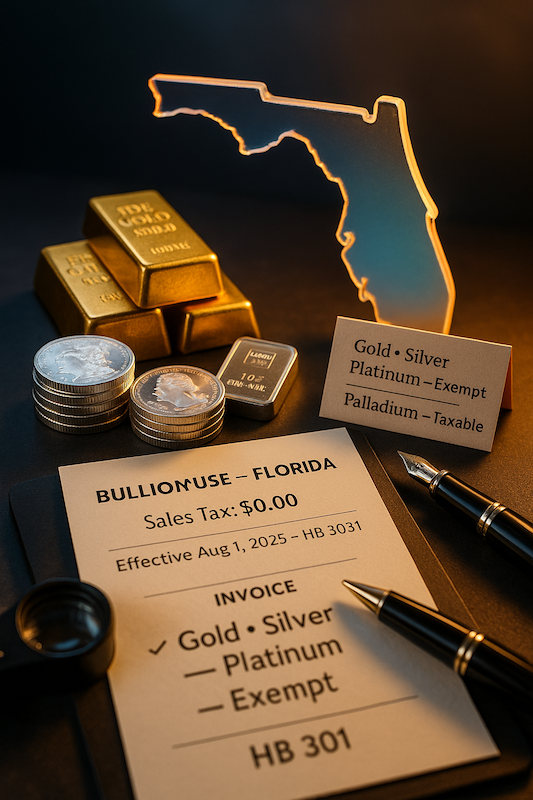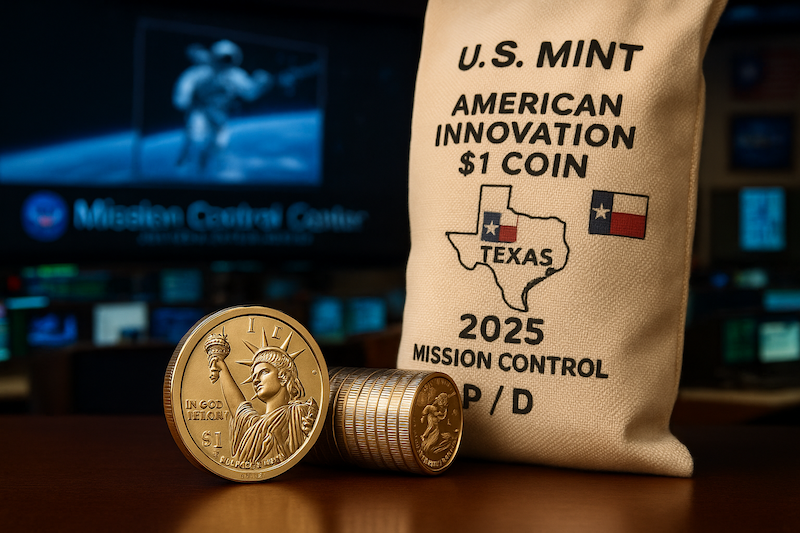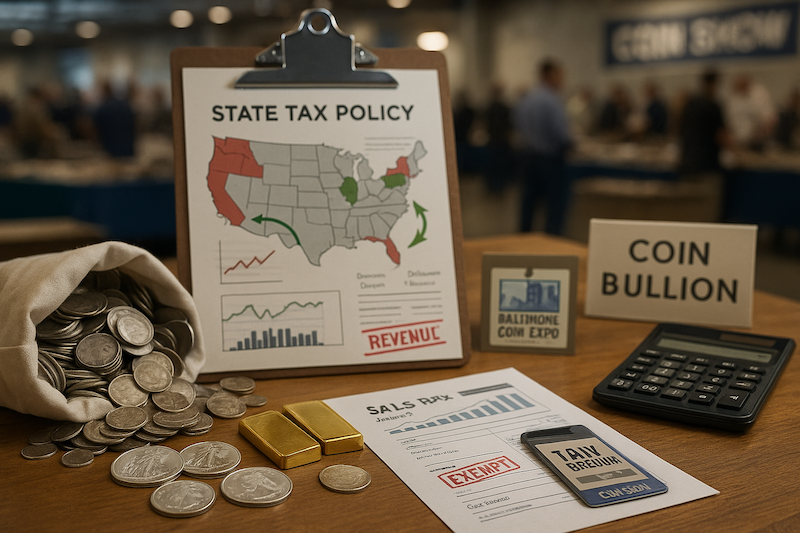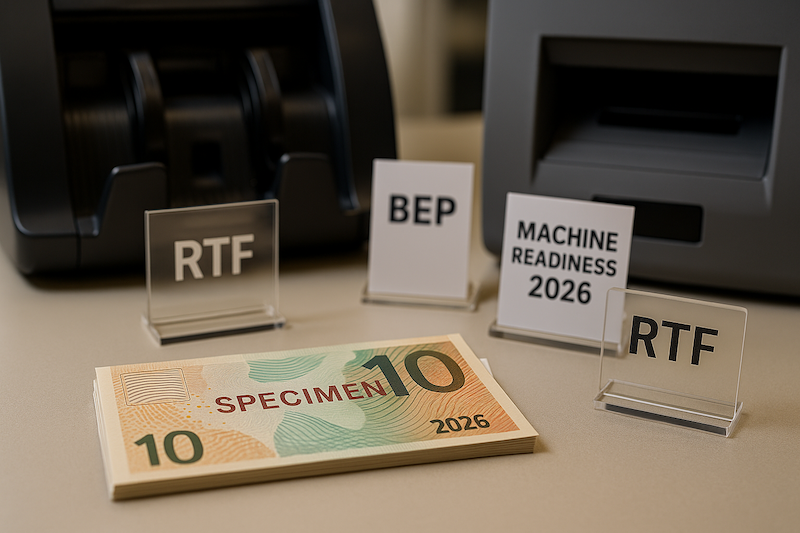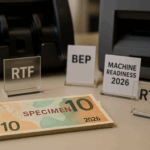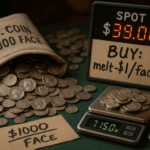TL;DR: Florida scrapped its $500 threshold on gold, silver, and platinum bullion effective August 1, 2025, making qualifying bullion sales tax-free at any amount. U.S. legal-tender coins were already exempt; some world/ancient coinsand palladium items may still be taxable. Know the definitions, mind county surtaxes where applicable to taxable items, and keep documentation.
If you’ve ever balked at adding a single silver round to your cart because tax would eat the deal, Florida just changed your math. As of August 1, 2025, the state removed the $500 minimum for the sales-tax exemption on gold, silver, and platinum bullion—a seemingly small tweak with outsized effects for collectors, small dealers, DCA-style investors, and anyone who prefers to buy incrementally.
Why this matters now
For years, Florida’s bullion exemption only kicked in when the single-transaction total for bullion exceeded $500. Smaller purchases—think one silver round or a fractional gold bar—were taxed, which tilted the field against new or small-ticket buyers. With HB 7031 signed and implemented, the barrier is gone; the exemption now applies regardless of price on qualifying bullion. That brings Florida in line with a broader national trend toward tax parity on precious-metals purchases and removes a friction point for the state’s vibrant coin and bullion market.
As the Florida Department of Revenue put it: “Effective August 1, 2025, sales of gold, silver, and platinum bullion are exempt from sales and use tax regardless of the sales price.”
Historically, Florida has toggled these rules more than once, and industry advocates note that exemptions in several states have been won, revoked, and reinstated over time—so clarity and documentation matter.
What changed in the Florida bullion and coin tax exemption (and what didn’t)
The big change: bullion
- Now exempt at any dollar amount: Gold, silver, and platinum bullion (bars/ingots/rounds meeting the rule’s definition) are exempt from Florida sales and use tax at any purchase size. Effective date: August 1, 2025.
- Statutory/legislative basis: HB 7031 amended Florida’s sales-tax statute; the DOR formalized the change in TIP 25A01-03.
What didn’t change: definitions and non-covered items
- “Bullion” definition: Under Rule 12A-1.0371, “bullion” is expressly gold, silver, or platinum in bars, ingots, or similar forms. That rule’s metal list does not include palladium—so palladium remains taxable unless some other exemption applies.
- Coins vs. bullion: Florida treats coins/currency separately from bullion.
- U.S. legal-tender coins (e.g., cents through dollars, American Eagles) are generally not taxable.
- Foreign coins are exempt only when sold at face value; otherwise, coin/currency sales may be taxable (subject to other thresholds or exemptions). The new August 1 change is about bullion, not a blanket coin exemption expansion.
- Ancient and certain world coins: Often taxable because they don’t meet Florida’s bullion definition and aren’t sold “at face value” as legal tender.
Takeaway: The reform squarely targets bullion. Coins enjoy some exemptions already (especially U.S. legal tender), but world/ancient coins can still be taxable depending on how they’re sold. When in doubt, check the item’s status against Rule 12A-1.0371 and keep your invoice language precise.l
How the Florida bullion and coin tax exemption works in practice
Quick buyer scenarios
- One 1-oz silver round, $35
Before Aug 1, 2025: Taxable (under $500).
Now: Exempt if it’s silver bullion as defined. (County surtax doesn’t apply because the state tax is exempted for this item.) - One American Gold Eagle (a U.S. legal-tender coin): Generally not taxable as a U.S. legal-tender coin under Florida’s coin rule, separate from the bullion exemption.
- One South African Krugerrand (legal tender of South Africa, typically sold above face/no face value shown on older issues): Often treated as a coin sold above face value, therefore taxable in Florida unless otherwise qualifying. Confirm with your dealer’s tax treatment.
- One palladium bar
Still taxable (palladium isn’t in the bullion metals list of the rule).
What about Florida’s 6% state rate and county surtaxes?
Florida’s state sales-tax rate is 6%. Counties may add a discretionary sales surtax (generally 0.5%–2.0%) on taxable transactions. For exempt bullion, these rates don’t apply; for taxable coins/currency or palladium, they do. Always verify the county rate where the item is delivered.
If you were charged tax after Aug 1, 2025 on exempt bullion
Ask the dealer for a refund (they, in turn, can seek credit/refund with the state). If needed, customers can pursue a refund using Form DR-26S and follow DOR instructions. Keep invoices and proof of payment.
Market context: Florida joins a broader national shift
Florida’s move mirrors a broader trend as states re-evaluate how they tax precious-metals transactions. Advocacy and industry reporting note that the number of states offering some form of exemption has steadily climbed in recent years, helping level access for small buyers and encouraging in-state commerce.
How Florida compares (2025 snapshot)
| State | What’s Exempt? | Threshold? | Notes |
|---|---|---|---|
| Florida | Gold, silver, platinum bullion | No | Effective Aug 1, 2025; coins/currency rules still apply under 12A-1.0371; palladium not listed as bullion. |
| Texas | Coins (incl. numismatic) and gold/silver/platinum bullion | No | Broad exemption long-standing under Tax Code §151.336. |
| California | Monetized bullion, non-monetized gold/silver bullion, and numismatic coins | Yes – $2,000(bulk sale) | Threshold adjusted 1/1/2023; taxable below $2,000. |
| New York | Precious-metal bullion under specific conditions | Varies by rule | Longstanding technical criteria in the regs; policy under periodic debate. |
This table is for quick comparison only; always consult current state law before relying on tax treatment.
Benefits, risks, and practical tips
Benefits
- Lower entry barrier: Small, recurring bullion purchases (DCA) no longer penalized by tax, improving price transparency for new collectors and investors.
- Dealer efficiency: Streamlined compliance on bullion SKUs; fewer split-transaction complications around $500.
- Competitive parity: Aligns Florida with many states that already provide full or broad sales-tax relief for bullion buyers.
Risks & watch-outs
- Definition traps: Palladium bullion and many world/ancient coins can still be taxable—don’t assume “precious metal” equals “exempt.”
- Invoice clarity: For mixed orders (e.g., exempt bullion + taxable numismatic coins), invoices should separately list items so exemptions are properly documented. (Florida DOR requires proper documentation.)
- Local surtax on taxable items: County surtaxes apply to taxable transactions; the rate depends on the delivery county.
Pro tips for collectors, dealers, and investors
- Label precisely. Ensure product descriptions match rule definitions (“gold bullion bar .9999 fine,” “U.S. legal-tender coin,” etc.). It protects your exemption.
- Segregate mixed orders. If you buy exempt bullion and taxable coins together, request itemized lines—the DOR emphasizes proper documentation of the exempt portion.
- Know your metals. Gold, silver, platinum bullion = exempt; palladium = generally taxable (unless another exemption applies).
- Mind delivery location. For taxable items, the county of delivery determines the surtax rate.
- Fix errors quickly. If you’re charged tax on exempt bullion, seek a dealer refund; if necessary, file DR-26S with the state.
Case study: What small buyers save under the new rule
A Miami buyer who dollar-cost averages 1 oz silver rounds weekly at $33:
- Old rule: 6% state tax + possible local surtax on each sub-$500 buy.
- New rule: $0 sales tax on each qualifying bullion purchase. Over 52 weeks, the buyer saves hundreds of dollars versus the old framework—savings that compound into more ounces. (Florida state rate reference).
Expert perspective (balanced)
- Policy clarity: Florida’s DOR guidance is unambiguous for bullion: “effective August 1, 2025… regardless of the sales price.” That gives both dealers and buyers confidence around compliance.
- But stay vigilant: As industry analysts have warned, precious-metals exemptions can be revisited in statehouses. Knowing the rules, documenting transactions, and supporting education/advocacy helps keep the market stable.
Frequently asked questions
1) Does Florida tax palladium?
Generally yes. The rule defining bullion lists gold, silver, and platinum only; palladium is not included, so it doesn’t benefit from the bullion exemption unless another exemption applies.
2) Are American Silver Eagles taxable in Florida?
They are U.S. legal-tender coins, which Florida treats as not taxable under the coin/currency rule—separate from the bullion exemption.
3) Are ancient or many world coins exempt?
Often no. Unless sold at face value as legal tender (rare for collectibles) or covered by another specific exemption, they can be taxable.
4) How do I claim a refund if I was charged tax on exempt bullion after Aug 1, 2025?
Ask the dealer first; dealers can adjust returns. If needed, file Form DR-26S with the Florida DOR and keep full documentation (invoice, proof of payment).
5) Do county surtaxes apply to exempt bullion?
No. If an item is exempt at the state level (e.g., qualifying bullion), county surtax doesn’t apply to that item. For taxableitems, county surtax does apply.
Historical/legal notes & sources you can cite
- DOR guidance (most important): Florida DOR TIP 25A01-03 announced the Aug 1, 2025 effective removal of the $500 minimum for gold, silver, and platinum bullion. Keep this PDF handy for bookkeeping and audits.
- Bill summary: The Florida Senate’s summary of HB 7031 clarifies that the bill exempts all sales of gold, silver, and platinum bullion regardless of sales price.
- Law text: Chapter 2025-208, Laws of Florida (HB 7031 enrolled) shows the relevant amendments to s. 212.08 and related provisions.
- Definitions: Rule 12A-1.0371 (Sales of Coins, Currency, or Bullion) explains what counts as bullion and how coins/currency are treated—key for mixed orders and world/ancient material.
- Rates: Florida’s 6% state rate and county discretionary surtax reference pages.
Internal linking ideas (if you’re publishing on a numismatic site)
- Florida Coin Taxes 101: A buyer’s guide to Florida’s coin vs. bullion rules (with examples).
- Palladium in Florida: What’s taxable, what’s not, and alternatives for investors.
- How to Read a Bullion Invoice: Itemization, purity markings, and documentation to preserve exemptions.
- State-by-State PM Tax Map: Compare Florida with TX, CA, NY, and others.
- Sales-Tax Refunds for Collectors: Step-by-step for using DR-26S (with a checklist).
Conclusion
Florida’s update is great news for the everyday bullion buyer and for dealers who serve them. By removing the $500 hurdle, the state extended the benefits of tax-free bullion to those who buy in small amounts or on a schedule. Remember, though: definitions drive taxability. Gold, silver, and platinum bullion are in; palladium is typically out; and coinsfollow their own rules—especially U.S. legal tender (generally exempt) vs. world/ancient (often taxable). With a little diligence on product labeling, invoicing, and record-keeping, collectors and investors can maximize the value of Florida’s reform while staying fully compliant. If you run into a mistake on a post-Aug 1 bullion sale, use the dealer path—or if necessary, Florida’s DR-26S refund process—to make it right.
